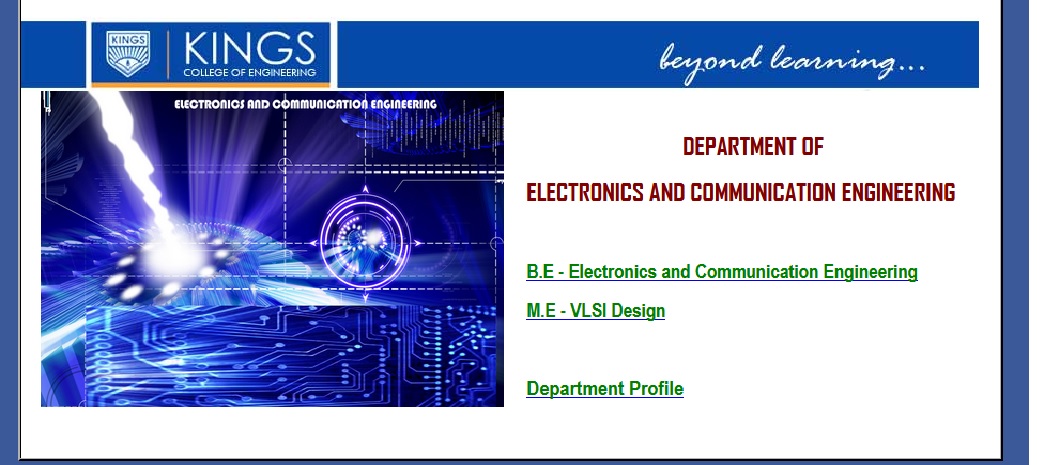EC2251 Electronic Circuits Question Bank : kings.ac.in
Name of the College : Kings College Of Engineering
Department : Electronics & Communication Engineering
Subject : Electronic Circuits
Website : kings.ac.in
Document Type : Question Bank
Download Model/Sample Question Paper : https://www.pdfquestion.in/uploads/ki…IRCUITS-II.pdf
Kings Electronic Circuits Question Paper
Unit I
Feedback Amplifiers
Part A :(2Marks)
1. Define positive feedback?
2. Define negative feedback?
Related : Kings College Of Engineering EE1352 Electrical Machine Design Question Bank : www.pdfquestion.in/1359.html
3. Define sensitivity?
4. What are the types of feedback?
5. Define feedback?
6. Write the expression for input and output resistance of voltage series feedback amplifier.
7. Give an example for voltage-series feedback.
8. Write the expression for input and output resistance of current shunt feedback amplifier.
9. Give the properties of negative feedback.
10. Give the effect of negative feedback on amplifier characteristics.

Part-B :(16 Marks)
1. What will happen when a step input voltage is applied to the high pass RC Circuit? (16)
2 .Explain the relevant information, how the negative feedback improves stability (16) reduce noise and increase input impedance? (16)
3. Explain voltage shunt feedback amplifiers? (16)
4. Explain current series feedback amplifiers? (16)
5. Explain the classification of amplifiers? (16)
6. Explain current shunt and voltage shunt feedback amplifiers? (16)
Unit II
Oscillators
Part A : (2Marks)
1. What is Oscillator circuit?
2. What are the classifications of Oscillators?
3. Define Barhausen Criterion.
4. What are the types of feedback oscillators?
5. What are the conditions for oscillation?
6. Define Piezoelectric effect.
7. Draw the equivalent circuit of crystal oscillator.
8. What is Miller crystal oscillator? Explain its operation.
9. State the frequency for RC phase shift oscillator.
10. Define Oscillator
11.Define Blocking Oscillator?
12. What are the two important elements of Blocking Oscillator?
13. What are the applications of blocking Oscillator?
14. Give the expression for co-efficient of coupling
15. Give the formula for transformation ratio
16. Define rise time
17. Define overshoot.
18. Define flat top response.
19. Define droop or a tilt
20. What are the applications of pulse transformer.
21. When do the core saturates?
22. What is the other name of astable Blocking Oscillator
23. What are the two types of astable Blocking Oscillator?
24. Define Sweeptime in sawtooth generator
25. What is the other name of sawtooth generator?
26. Define Displacement error in the sawtooth generator?
27.What is constant current charging?
28. What is the miller circuit
Part-B :(16 Marks)
1. With simple diagrams explain the operation of negative resistance oscillator using tunnel diode? (16)
2. Explain RC phase shift oscillator? (16)
3. Explain Clapp’s oscillator and derive the expression for frequency of oscillation. (16)
Also explain how frequency stability can be improved Clapp’s oscillator. (16)
4. Explain Hartly oscillator and derive the equation for oscillation? (16)
5. Explain pierce crystal oscillator and derive the equation for oscillation? (16)
Unit III
Tuned Amplifiers
Part A : (2Marks)
1. What is a tuned amplifier?
2. What is the expression for resonant frequency?
3. What happens to the circuit above and below resonance?
4. What are the different coil losses?
5. What is Q factor?
6. What is dissipation factor?
7. What is the classification of tuned amplifiers?
8. What is a single tuned amplifier?
9. What are the advantages of tuned amplifiers?
10. What are the disadvantages of tuned amplifiers?
11. What is neutralization?
12. What are double tuned amplifiers?
13. What is a stagger tuned amplifier?
14. What are the advantages of stagger tuned amplifier?
15. What are the different types of neutralization?
16. What is rice neutralization?
17. What is unloaded Q?
18. What are the applications of mixer circuits?
19. What is up converter?
Part-B :(16 Marks)
1. Explain in detail about single tuned amplifier (16)
2. Explain in detail about double tuned amplifier. (16)
3. Explain in detail about stagger-tuned amplifier (16)
4. Compare single tuned and double tuned amplifier (16)
5. Explain the different types of neutralization? (16)